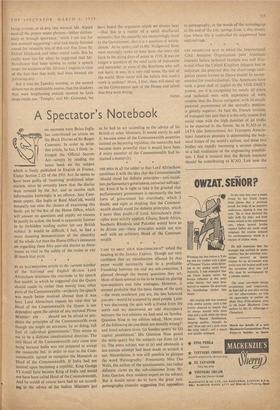IN AN ILLUMINATING article in the current number of the
National and English Review Lord Altrincham discusses the reactions to his speech last month, in which he suggested that the Queen should reside in, rather than merely tour, other parts of the Commonwealth—evidently the speech was much better received abroad than it was here. Lord Altrincham repeats his view that 'as Head of the Commonwealth the Queen is not dependent upon the advice of any national Prime Minister : she . . . should not be afraid to pro- claim the principles of the Commonwealth even though she might on occasion, by so doing, fall foul of individual governments.' This seems to me to be a dubious constitutional doctrine. The title Head of the Commonwealth only came into being because India was not prepared to accept the monarchy but, in order to stay in the Com- monwealth, agreed to recognise the Monarch as Head of the Commonwealth. If India had not insisted upon becoming a republic, King George VI would have become King of India and would not have been called Head of the Commonwealth. And he would of course have had to act accord- ing to the advice of his Indian Ministers just as he had to act according to the advice of his British or other Ministers. It would surely be odd if, because some of the Commonwealth countries insisted on becoming republics, the monarchy had become more powerful than it would have been if every member of the Commonwealth had re- mained a monarchy.


































 Previous page
Previous page